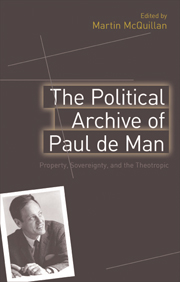Book contents
- Frontmatter
- Contents
- List of Abbreviations
- Acknowledgements
- Notes on Contributors
- Introduction: Broken Promises: Rousseau, de Man and Watergate
- 1 Lovence in Rousseau's Julie ou la Nouvelle Héloïse
- 2 Reading Spectacles in Rousseau's Letter to d'Alembert
- 3 The Utter Misery of the Human Mind: Apotropaic and Theotropic in de Man's Rousseau
- 4 Rhetoric and Rausch: de Man on Nietzsche on Value and Style
- 5 Theotropic Logology: J. Hillis Miller, Paul de Man and Kenneth Burke
- 6 Normativity, Materiality and Inequality: The Politics of the Letter in Paul de Man
- 7 Inscribing the Political: Paul de Man and the Wild Art of Letter Writing
- 8 Mistake in Paul de Man: Violent Reading and Theotropic Violence
- 9 Lightstruck: ‘Hegel on the Sublime’
- 10 De Man vs. ‘Deconstruction’: or, Who, Today, Speaks for the Anthropocene?
- 11 Paul de Man at Work: What Good is an Archive?
- 12 DNA: de Man's Nucleic Archive
- 13 Sovereign Debt Crisis: Paul de Man and the Privatization of Thought
- Appendix: Nietzsche I: Rhetoric + Metaphysics
- Index
13 - Sovereign Debt Crisis: Paul de Man and the Privatization of Thought
Published online by Cambridge University Press: 05 August 2013
- Frontmatter
- Contents
- List of Abbreviations
- Acknowledgements
- Notes on Contributors
- Introduction: Broken Promises: Rousseau, de Man and Watergate
- 1 Lovence in Rousseau's Julie ou la Nouvelle Héloïse
- 2 Reading Spectacles in Rousseau's Letter to d'Alembert
- 3 The Utter Misery of the Human Mind: Apotropaic and Theotropic in de Man's Rousseau
- 4 Rhetoric and Rausch: de Man on Nietzsche on Value and Style
- 5 Theotropic Logology: J. Hillis Miller, Paul de Man and Kenneth Burke
- 6 Normativity, Materiality and Inequality: The Politics of the Letter in Paul de Man
- 7 Inscribing the Political: Paul de Man and the Wild Art of Letter Writing
- 8 Mistake in Paul de Man: Violent Reading and Theotropic Violence
- 9 Lightstruck: ‘Hegel on the Sublime’
- 10 De Man vs. ‘Deconstruction’: or, Who, Today, Speaks for the Anthropocene?
- 11 Paul de Man at Work: What Good is an Archive?
- 12 DNA: de Man's Nucleic Archive
- 13 Sovereign Debt Crisis: Paul de Man and the Privatization of Thought
- Appendix: Nietzsche I: Rhetoric + Metaphysics
- Index
Summary
Even if He exists, He's done such a terrible job it's a wonder people don't file a class action suit against Him.
Woody AllenHaving established some basic principles of rhetorical reading in his account of the Second Discourse and then established a process for ‘the deconstruction of metaphor’ in the example of ‘Self (Pygmalion)’, the 1979 published text of Allegories of Reading goes on to consider further the fictional text of the Julie. De Man finds in the second half of that book the extrapolation of the ethical relation between the lovers played out in a presentation of the relation between religion and politics in Clarens, the implications of which he will bundle out into the next two chapters in an inter-related analysis of the Profession de foi and The Social Contract. In both cases he wishes to understand whether religious texts and political texts differ from a rhetorical point of view; in the background to this analysis lies the question that de Man is working toward answering: whether literary and philosophical texts differ rhetorically. While de Man's seamless exposition appears to swing from one text of Rousseau to another in a series of interlocking readings, the manuscript of Textual Allegories shows up certain difficulties he experiences in extending his thesis ever further into the text of Rousseau. In order to produce the appearance of a continuous argument in Allegories of Reading, de Man systematically edits out the difficulties he attempts to work through in Textual Allegories, resulting in an argument that is simultaneously both more cohesive and, in its concentration, leaves itself open to precisely the sort of rhetorical effects that de Man describes in his reading of Rousseau.
- Type
- Chapter
- Information
- The Political Archive of Paul de ManProperty, Sovereignty and the Theotropic, pp. 167 - 178Publisher: Edinburgh University PressPrint publication year: 2012



